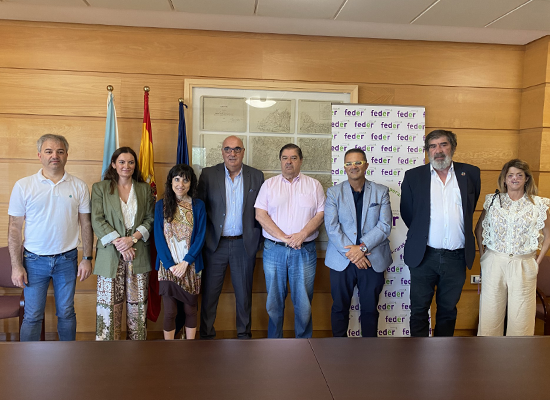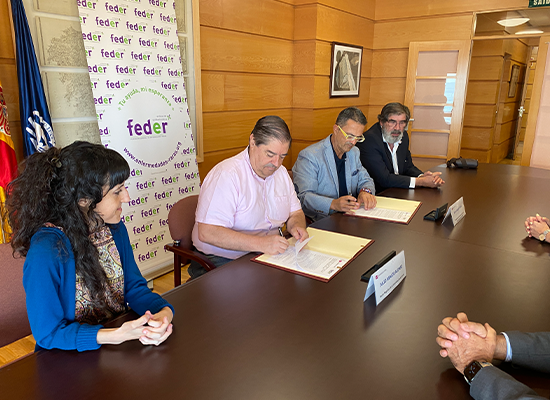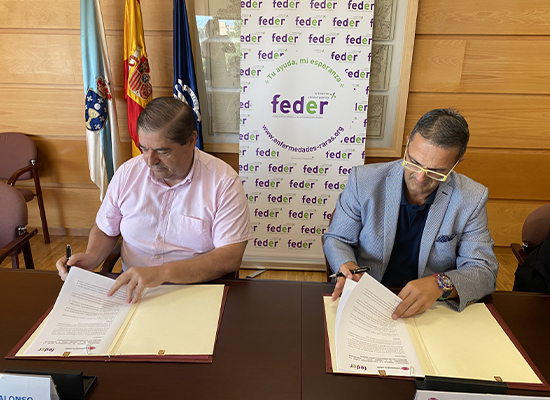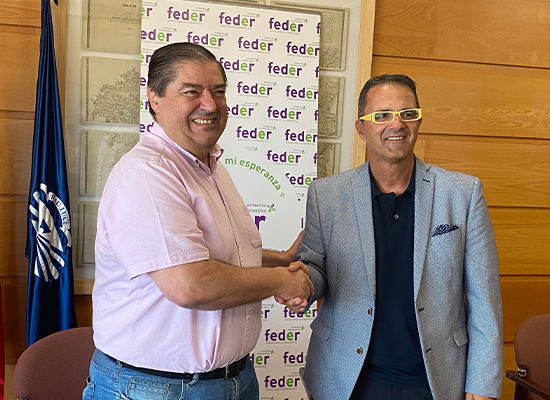
The University of A Coruña and the Spanish Federation for Rare Diseases to promote research and training in this field
The Rector of the University of A Coruña (UDC), Julio Abalde, and the President of the Spanish Federation for Rare Diseases (FEDER), Juan Carrión, signed a collaboration agreement yesterday to promote the exchange of experiences and personnel in the areas of teaching, research, and culture, with a particular focus on rare diseases.
This agreement formalizes and strengthens an academic and scientific partnership between both institutions, set to last a minimum of four years. The goal is to drive participation in research programs, train FEDER’s care staff and its associative network, and facilitate the exchange of knowledge that will enable both UDC and FEDER to work toward their shared goals. The collaboration, which dates back several years, has already resulted in joint initiatives and expert consulting on assistive technologies and Augmentative and Alternative Communication Systems (AAC), benefiting organizations, patients, and families most in need.
The Rector expressed his satisfaction with the signing of this knowledge transfer agreement, highlighting the importance of leveraging information and communication technologies (ICT) to advance society. “Public institutions must be drivers of progress, and it is an honor to be part of this project and this partnership,” he stated.
In turn, FEDER’s President emphasized that this collaboration will directly support the autonomy of children living with rare diseases. Carrión noted that the alliance with UDC “strengthens us and allows us to move forward,” adding that when it comes to rare diseases, “research is our future and our hope.”
The signing ceremony was also attended by Dr. Thais Pousada, health sciences PhD, occupational therapist and nurse, professor at UDC and researcher at the UDC’s Centre for Research in Information and Communication Technologies (CITIC), as well as a member of FEDER’s Advisory Committee. Other attendees included Manuel González Penedo and Javier Pereira, Director and Deputy Director of CITIC respectively; Fide Mirón, Vice President of FEDER; and Santiago de la Riva, Vice President of the FEDER Foundation.
UDC Technology at the Service of People with Rare Diseases
Following the signing, FEDER representatives visited CITIC to learn first-hand about the university’s research and technological development efforts and their potential applications for people with rare diseases.
In recent years, FEDER has worked extensively in the field of accessibility and training related to assistive technologies—especially AAC systems and computer and mobile device access tools—targeting individuals who, due to their condition, require special equipment or software to communicate.
During the visit to CITIC, the delegation had the opportunity to explore some of the center’s initiatives, including the development of customized virtual reality environments for rehabilitation and the design and production of 3D-printed assistive products. These technologies can be made available to individuals in Galicia affected by rare or undiagnosed diseases—a population estimated to exceed 200,000 people regionally. However, despite UDC and CITIC being based in Galicia, the agreement aims to have nationwide reach, making these resources accessible to professionals, patients, and families across Spain, with a particular emphasis on supporting communication as a tool for social participation.
The Seed of the Agreement: FEDER’s Advisory Committee
Although the agreement was signed recently, collaboration between FEDER and the University of A Coruña was already in place thanks to the involvement of Thais Pousada in FEDER’s Scientific Advisory Committee for its Information and Guidance Service.
Dr. Pousada has been a member of this committee since its establishment in 2013, working alongside 25 other experts from clinical, pharmacological, scientific, and social fields—including occupational therapy—to help FEDER respond to healthcare and social care inquiries and undiagnosed cases received by the organization.








